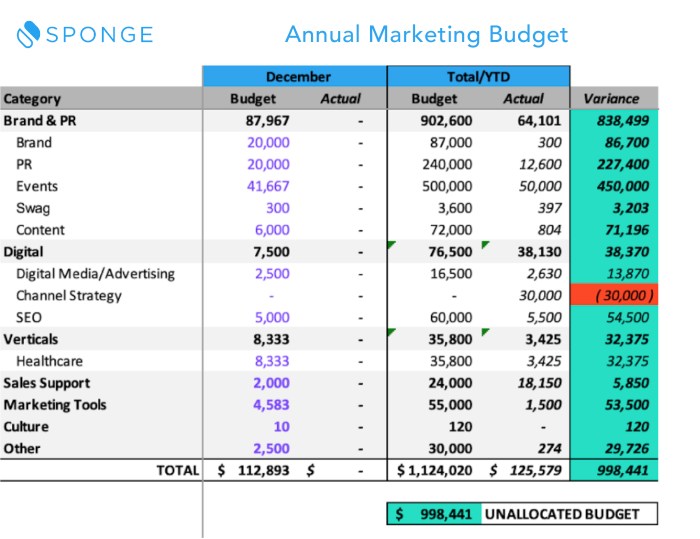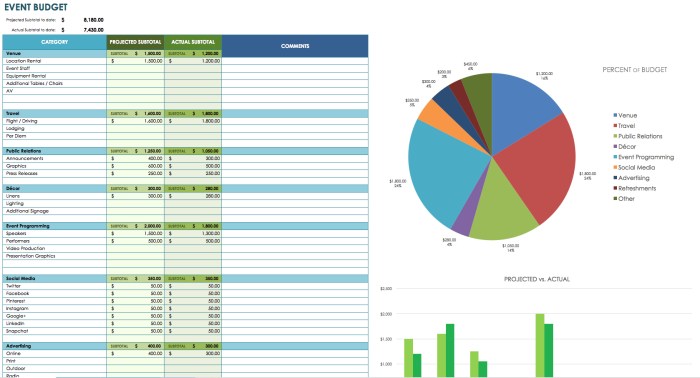Developing a Marketing Budget sets the stage for business growth and success, ensuring resources are allocated effectively and goals are met. Dive into this essential aspect of business planning with a fresh perspective that blends practicality with innovation.
As you navigate through the key components and strategies involved in crafting a marketing budget, you’ll uncover the secret to maximizing your marketing efforts while staying within budget constraints.
Importance of Developing a Marketing Budget

Creating a marketing budget is crucial for businesses to ensure they allocate resources effectively and maximize their return on investment. Without a well-structured budget, companies may overspend on ineffective strategies or miss out on opportunities to reach their target audience.
Benefits of Having a Well-Thought-Out Marketing Budget
- Allows for strategic planning: A marketing budget helps businesses plan their marketing efforts in advance, ensuring they have a clear roadmap to follow.
- Optimizes spending: By setting a budget, companies can prioritize their marketing initiatives and allocate resources where they will have the most impact.
- Evaluates performance: Having a budget in place allows businesses to track the effectiveness of their marketing campaigns and make adjustments as needed to improve results.
How a Marketing Budget Aligns with Overall Business Goals
A well-developed marketing budget should align with the overall objectives and goals of the business. By setting specific targets for marketing spend and ROI, companies can ensure that their marketing efforts are contributing to the success of the organization as a whole.
Factors to Consider When Developing a Marketing Budget

When developing a marketing budget, there are several key factors to consider to ensure its effectiveness and efficiency. Market research, past performance, and industry trends all play a crucial role in setting realistic budget goals.
Key Elements to Include in a Marketing Budget
- Digital marketing expenses, including social media ads, PPC campaigns, and email marketing costs.
- Traditional marketing costs like print ads, TV commercials, and direct mail campaigns.
- Staffing and agency fees for marketing professionals and outsourced services.
- Event marketing expenses for trade shows, conferences, and promotional events.
- Research and analytics tools to measure the effectiveness of marketing campaigns.
The Importance of Market Research in Budget Planning
Market research provides valuable insights into consumer behavior, market trends, and competitor strategies. By conducting thorough research, companies can better understand their target audience and tailor their marketing efforts accordingly. This information is crucial in allocating budget resources effectively and maximizing the return on investment.
Setting Realistic Budget Goals Based on Past Performance and Industry Trends
- Review past marketing campaigns to identify what worked well and what didn’t.
- Analyze industry trends to anticipate changes and stay ahead of the competition.
- Set SMART goals (Specific, Measurable, Achievable, Relevant, Time-bound) based on historical data and market insights.
- Adjust budget allocations as needed throughout the year to optimize performance and ROI.
Strategies for Allocating Budget Across Different Marketing Channels
When it comes to allocating your marketing budget across various channels, it’s essential to consider where your target audience is most active and how each channel can help you achieve your marketing goals effectively.
Examples of Various Marketing Channels
- Social Media Marketing: Platforms like Facebook, Instagram, Twitter, and LinkedIn
- Content Marketing: Blogs, videos, podcasts, and infographics
- Search Engine Marketing: Google Ads, Bing Ads, and
- Email Marketing: Newsletters, promotional emails, and drip campaigns
- Influencer Marketing: Collaborating with influencers in your industry
Importance of Diversifying Budget Allocation
By diversifying your budget allocation across different marketing channels, you can reach a wider audience and increase brand visibility. It also helps in reducing the risk of relying too heavily on one channel, which could be detrimental if that channel loses effectiveness or becomes oversaturated.
Determining the Most Effective Channels
- Understand Your Target Audience: Conduct market research to identify where your audience spends their time online.
- Set Clear Marketing Goals: Determine what you want to achieve with your marketing efforts, whether it’s brand awareness, lead generation, or sales.
- Track and Analyze Results: Use analytics tools to monitor the performance of each channel and adjust your budget allocation based on what’s working best.
Tools and Software for Managing Marketing Budgets
Managing a marketing budget efficiently is crucial for the success of any marketing campaign. Fortunately, there are various tools and software available to help streamline the budgeting process and track expenses effectively.
Popular Tools and Software for Budget Tracking
- 1. QuickBooks: A widely used accounting software that offers features for budgeting, expense tracking, and financial reporting.
- 2. Excel: While not specifically designed for budget management, Excel is a versatile tool that can be customized for budget tracking purposes.
- 3. AdStage: A platform that allows marketers to track and optimize advertising campaigns across multiple channels while managing budgets.
Comparison of Budget Management Platforms, Developing a Marketing Budget
| Platform | Features | Pricing |
|---|---|---|
| QuickBooks | Expense tracking, budgeting tools, financial reporting | Starting at $25 per month |
| Excel | Customizable budget templates, data analysis tools | Part of Microsoft Office Suite |
| AdStage | Advertising campaign tracking, budget optimization | Custom pricing based on features |
Benefits of Using Technology for Budgeting
- Efficiency: Automation and digital tools can streamline budgeting processes, saving time and reducing errors.
- Accuracy: Software can provide real-time insights and data analysis to ensure precise budget tracking.
- Collaboration: Online platforms allow teams to work together on budgeting tasks, promoting transparency and communication.
